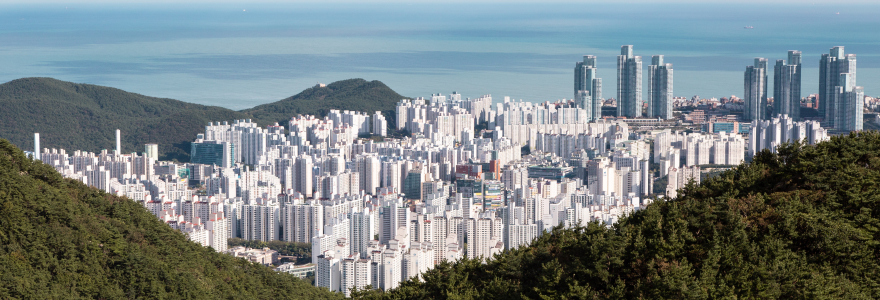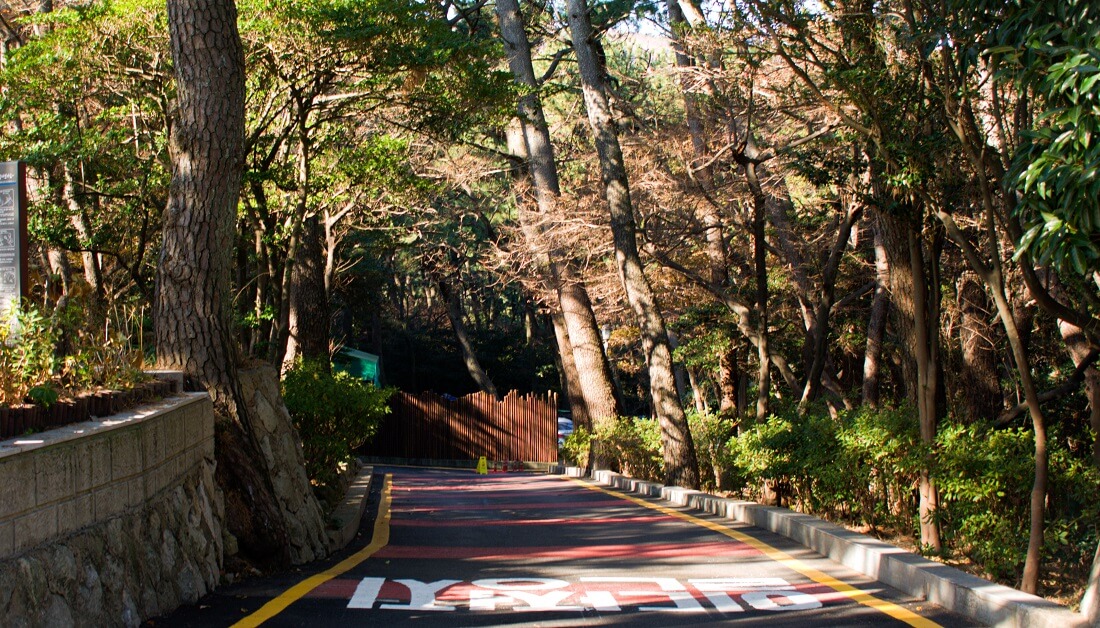Most expats moving to Busan won’t have to go through the process of finding their own apartment, as many employers provide their employees with suitable accommodation – this is especially true for expats teaching English in Busan. Those who want to rent their own accommodation will find that Busan is quite affordable compared to Seoul.
Due to the short-term nature of expat assignments, most people tend to rent rather than buy property. Rentals tend to move quickly in Busan, and so it's important to research the process ahead of time.
Areas and suburbs in Busan
Busan is home to 15 autonomous districts and one county, divided into more than 200 neighbourhoods, making for an interesting mix of areas and suburbs. Accommodation in Busan suits all lifestyles. Young and single expats gravitate towards the trendy suburbs of Centum City, Marine City, Nampo-dong, and Gwangan-dong. These areas boast some of Busan’s best cultural, shopping and lifestyle attractions.
Geumjeong-gu sits at the base of Geumjeongsan Mountain and makes an excellent home for sports enthusiasts who want regular access to mountain biking, hiking, rock climbing, and hang gliding. The popular Haeundae-gu makes for both family-friendly living and countless attractions, including Haeundae Beach. Tourists and expat families alike flock here for the entertainment options.
Families will find plenty of suitable suburbs in Busan beyond the younger expat hotspots. Perched in western Busan, Sasang-gu is a nature wonderland filled with various forest parks and trails. It is ideal for expat families looking to escape city life while maintaining proximity to key business centres. Consisting only of islands, Yeongdo-gu is another family-friendly district in Busan that has plenty of opportunities for experiencing nature and exploring the city’s history.
Areas and Suburbs in Busan
Types of accommodation in Busan
The types of accommodation available in Busan are similar to those found elsewhere in Korea, and most residents live in apartments. Large multi-storey apartment blocks and smaller apartment buildings are found throughout Busan.
Less popular forms of accommodation include individual houses, officetels and villas. Owing to space constraints, single-family homes and villas are hard to come by in Busan. Officetels are mixed-use properties combining residential and office spaces. These typically feature more modern amenities and enhanced security.
Finding accommodation in Busan
Finding accommodation in Busan can be a struggle for expats who aren’t provided housing by their employer. Expat social media groups and online property portals are useful starting points.
Although most real estate agents in Busan don’t speak English, they may still be the best option for expats to find accommodation. These agents act as mediators between the property owner and the tenant. Expats are more likely to find English-speaking agents in neighbourhoods popular with expats. Korean friends or colleagues can ease the search considerably.
Renting accommodation in Busan
Making an application
Once expats have found a property that meets their requirements, the next step would be to sign a lease and secure the accommodation. The rental market moves quickly in Busan. Expats need all documents and fees ready before viewings. Landlords require a residence card, proof of employment and a passport from prospective tenants.
Leases, costs and fees
Typical leases in Busan run for two years under the jeonse or banjeonse systems, although it is possible to negotiate shorter contracts. Tenants who terminate the lease early typically must provide advance notice as specified in their contract. Tenants renting under the jeonse or banjeonse systems have to pay a large deposit (or ‘key money’) to secure a property. The deposit amount is negotiable. Larger deposits typically secure lower monthly rents.
Landlords deduct repair costs for damages from the tenant's deposit when they move out. The remainder of the deposit is returned to the tenant.
Read more about Renting Expat Accommodation in South Korea
Utilities in Busan
Utilities in Busan aren’t typically included in the monthly rent. Expats need to budget separately for these expenses. Bills can be paid via bank transfer, ATM or mobile app. Some convenience stores also accept utility payments.
Electricity and gas
Electricity in Busan comes from Korea Electricity Power Corporation (KEPCO), South Korea’s sole provider. New arrivals can register an account online, at their local KEPCO office or by mail. They will need to submit proof of identification to secure a connection. KEPCO sends monthly bills. Some apartments include electricity in the management fee.
Busan City Gas, the main gas supplier in Busan, delivers natural gas to homes through underground pipes. Residents need to provide their residence card and proof of identification to connect to their building’s gas supply. The company will send a service agent who will set up the connection, check for leaks and ensure that the line is safe.
When moving out, expats will need to call out a service agent again to disconnect the apartment. Residents with indoor meters report monthly usage to the gas company for billing. Outdoor meters are read automatically.
Water
Most of Busan’s drinking water comes from the Nakdong River, and the supply is managed by the Busan Metropolitan City Office of the Water Supply. Only expats moving into single-family homes will need to set up a water connection. Those moving into apartments, officetels or villas will likely have a connection ready and will simply need to change the bill to their name by calling or visiting their local waterworks office.
Bins and recycling
South Korea’s rubbish disposal system mandates that all the rubbish that individuals and businesses produce be paid for and disposed of properly. Rubbish in Busan is separated into different coloured regulation bags. These regulation bags are available for purchase from supermarkets or convenience stores, and in more rural areas, they can be purchased from the local government office.
There are several waste categories in Korea, including general, recyclable and food waste. General waste typically includes items such as old clothing and shoes, as well as used hygiene and sanitary products, while recyclable waste is usually plastic, paper, cans, and bottles.
Food waste in Busan works differently from the rest of Korea. The city uses reusable food waste bins rather than special plastic bags. The bins will usually be marked with a chip or sticker to indicate that the food waste removal fee has been paid. Larger apartment buildings will typically have freestanding food waste bins that are placed in a common area or included as part of a contraption that weighs food waste and calculates the cost accordingly. Smaller complexes may require residents to buy their own bins and chips.
For larger rubbish items such as furniture, expats living in large apartment complexes can liaise with their building management to pay for the removal and disposal of the waste. Those living in smaller buildings can contact their local district office, pay a fee and place the item in the designated collection area along with the payment sticker provided by the district office.
Rubbish collection days will differ in each of Busan’s 15 districts, but the collection is usually done late in the evening. The general waste bags will also have collection days printed on them.
Internet
Busan has excellent telecommunications infrastructure and even offers a free Wi-Fi service at key tourist, cultural and sports facilities as well as the city’s beaches. There are also several providers offering reliable and fast mobile and internet services.
Keeping in Touch in South Korea

